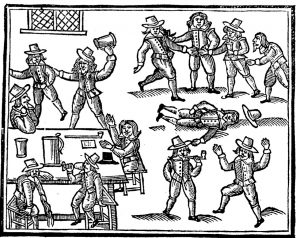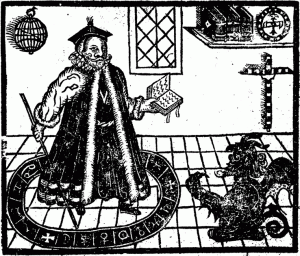Joseph Hall’s ‘Labeo’ is a better fit for Shakespeare than any other writer of the period. Labeo’s poems as we have seen, share strong stylistic qualities with Shakespeare’s two narrative poems (the only works published as Shakespeare’s at the time Hall was writing), and Labeo, like Shakespeare, appealed to Phoebus (Apollo) to help him write, and stole whole pages of text from Petrarch.
The final identifying mark is the sexual nature of these poems: the future bishop urges the author to ‘write cleanly Labeo, or write none’. The erotic content of Venus and Adonis is considered a key reason why it became a best-seller, and was read to disintegration (only one copy of the first edition survives). The Rape of Lucrece, though darker and more disturbing, nevertheless has a sexual act at its core. Hall asks:
But who coniur’d this bawdy Poggies ghost,
From out the stews of his lewd home-bred coast:
Or wicked Rablais dronken revellings,
To grace the mis-rule of our Tavernings?
[…]
For shame write cleanly Labeo, or write none.
This section begins with a question about authorship: ‘But who conjured this …’? We have already noted that Hall has accused the author of publishing ‘under another’s name‘; now he is prompting the reader to question who the author might be. ‘Rablais’ is a reference to François Rabelais, a major writer of the French renaissance known for the bawdiness of his tales. But as far as I can ascertain, there has been little discussion of the phrase ‘Poggies ghost’ in the academic literature or elsewhere.
 The reference is somewhat obscure. ‘Poggi’ is Italian for ‘hillock’. There was a Cardinal Giovani Poggio or Poggi, who died in the mid-sixteenth century. A note by Alexander Groshart in The Complete Poems of Joseph Hall (1879) suggests that ‘Poggi’ refers to The Facetiae of Poggio Bracciolini, called ‘the most famous jokebook of the Renaissance’; Poggio’s writing style has been described as ‘mildly erotic wit’.[1] Stylistically, this is another good fit for Venus and Adonis.
The reference is somewhat obscure. ‘Poggi’ is Italian for ‘hillock’. There was a Cardinal Giovani Poggio or Poggi, who died in the mid-sixteenth century. A note by Alexander Groshart in The Complete Poems of Joseph Hall (1879) suggests that ‘Poggi’ refers to The Facetiae of Poggio Bracciolini, called ‘the most famous jokebook of the Renaissance’; Poggio’s writing style has been described as ‘mildly erotic wit’.[1] Stylistically, this is another good fit for Venus and Adonis.
A search on Early English Books Online turns up no other references to ‘Poggie’ or ‘Poggy’ but does lead us to two works by Nicholai Machiavelli, an author much read and referenced by writers of the 16th century. One refers to the whole family Poggi who rebelled against their ruler, Castruccio Castracani. When Stephano Poggi persuaded them to settle their differences, Castracani at first promised them pardons, saying ‘that he thank’d his stars for giving him such an opportunity of signalizing his clemency’ and then (perhaps predictably) had the whole family (including Stephano Poggi) executed. The second refers to a Giacopo di Poggio: ‘a young man well learned, but ambitious, & delighting in change’ who was persuaded to join a conspiracy and subsequently executed for his part in it. Machiavelli’s two examples of rebellious and (unfairly?) executed Poggies seem the most likely Poggies to generate ghosts.
 But Hall’s Poggie’s ghost is also bawdy, linked to drunkenness, taverns and stews (neighbourhoods occupied mostly by brothels). The reference to ‘his lewd home-bred coast’ needs unpacking. Home-bred meant native or indigenous, but around this time, it also came to mean uncultured or unsophisticated, as when Robert Carew in 1602 said ‘Not only the home bred multitude… but even persons of the better calling.’ The original meaning of ‘coast’ was ‘side’, which might refer to the side of the body as much as to the side of the land (the only meaning we still give it). Might it be used here to mean the side of a person, as in ‘his lewd uncultured side’?
But Hall’s Poggie’s ghost is also bawdy, linked to drunkenness, taverns and stews (neighbourhoods occupied mostly by brothels). The reference to ‘his lewd home-bred coast’ needs unpacking. Home-bred meant native or indigenous, but around this time, it also came to mean uncultured or unsophisticated, as when Robert Carew in 1602 said ‘Not only the home bred multitude… but even persons of the better calling.’ The original meaning of ‘coast’ was ‘side’, which might refer to the side of the body as much as to the side of the land (the only meaning we still give it). Might it be used here to mean the side of a person, as in ‘his lewd uncultured side’?
 Who might Hall mean by ‘Poggies ghost’? If we were to select a candidate from any writer of the period, the best fit is surely Christopher Marlowe. Marlowe was a learned, ambitious and rebellious young man, who was linked by his contemporaries with taverns and unsavoury neighbourhoods. His contemporary Robert Greene, for example, accused him of frequenting brothels; saying of Marlowe and his friend that ‘too much frequenting the hot house (to use the German proverb) hath sweat out all the greatest part of their wits’.[2] Two ‘Poggies’ would remind the well-read Elizabethan of Machiavelli, with whom Marlowe is associated: he made Machiavelli a character in The Jew of Malta, having him deliver the prologue.
Who might Hall mean by ‘Poggies ghost’? If we were to select a candidate from any writer of the period, the best fit is surely Christopher Marlowe. Marlowe was a learned, ambitious and rebellious young man, who was linked by his contemporaries with taverns and unsavoury neighbourhoods. His contemporary Robert Greene, for example, accused him of frequenting brothels; saying of Marlowe and his friend that ‘too much frequenting the hot house (to use the German proverb) hath sweat out all the greatest part of their wits’.[2] Two ‘Poggies’ would remind the well-read Elizabethan of Machiavelli, with whom Marlowe is associated: he made Machiavelli a character in The Jew of Malta, having him deliver the prologue.
The Marlovian case for the authorship of the Shakespeare canon centres on Marlowe faking his death in order to escape being (unfairly) executed by the state (as Machiavelli’s Poggies were). As he was supposed to have been killed in a tavern brawl some four years before the publication of Halls’ Vergidemiarum, one would be hard pressed to find a better fit for ‘this bawdy Poggies ghost’.
 The earlier phrase relating to Labeo’s complaining about ‘wronged faith or fame’ is also a good fit for Marlowe who was famously outspoken and was facing charges of atheism and heresy when he was supposedly stabbed in an argument over a bill for food and drink. Hall’s use of the word ‘conjure’ (‘who conjured up this bawdy Poggies ghost’) is also fitting for a man famous for his stage-rendering of the hell-bound magician, Dr Faustus. Is Hall saying that the author of Venus and Adonis and The Rape of Lucrece is writing like Marlowe? If so, he is not alone, for numerous modern scholars have noted the same thing: the editors of the recent Arden edition of Shakespeare’s Poems, for example, describe ‘compelling links’ between Venus and Adonis and Marlowe’s Hero and Leander.[3] Marlowe, who had also translated Ovid’s Amores, the source of the quote on Venus‘s title page, specialized in epic poetry of a sexual nature.
The earlier phrase relating to Labeo’s complaining about ‘wronged faith or fame’ is also a good fit for Marlowe who was famously outspoken and was facing charges of atheism and heresy when he was supposedly stabbed in an argument over a bill for food and drink. Hall’s use of the word ‘conjure’ (‘who conjured up this bawdy Poggies ghost’) is also fitting for a man famous for his stage-rendering of the hell-bound magician, Dr Faustus. Is Hall saying that the author of Venus and Adonis and The Rape of Lucrece is writing like Marlowe? If so, he is not alone, for numerous modern scholars have noted the same thing: the editors of the recent Arden edition of Shakespeare’s Poems, for example, describe ‘compelling links’ between Venus and Adonis and Marlowe’s Hero and Leander.[3] Marlowe, who had also translated Ovid’s Amores, the source of the quote on Venus‘s title page, specialized in epic poetry of a sexual nature.
[1] Barbara C. Bowen (1988), One hundred Renaissance jokes: an anthology, p. 5.
[2] From the preface of Robert Greene’s Menaphon (1588), it is a reference to the Badestube, the German traditional bathhouse that, since the Middle Ages, was frequently combined with a brothel. Greene’s jibe that Marlowe and his friend ‘hath sweat out all the greatest part of their wits’ suggests the mercury-vapour steam-baths used to treat syphilis.
[3] Katherine Duncan-Jones & H.R. Woudhuysen (eds), Shakespeare’s Poems (Arden 2007), p21.
Click Here to Subscribe and we’ll notify you about new content.